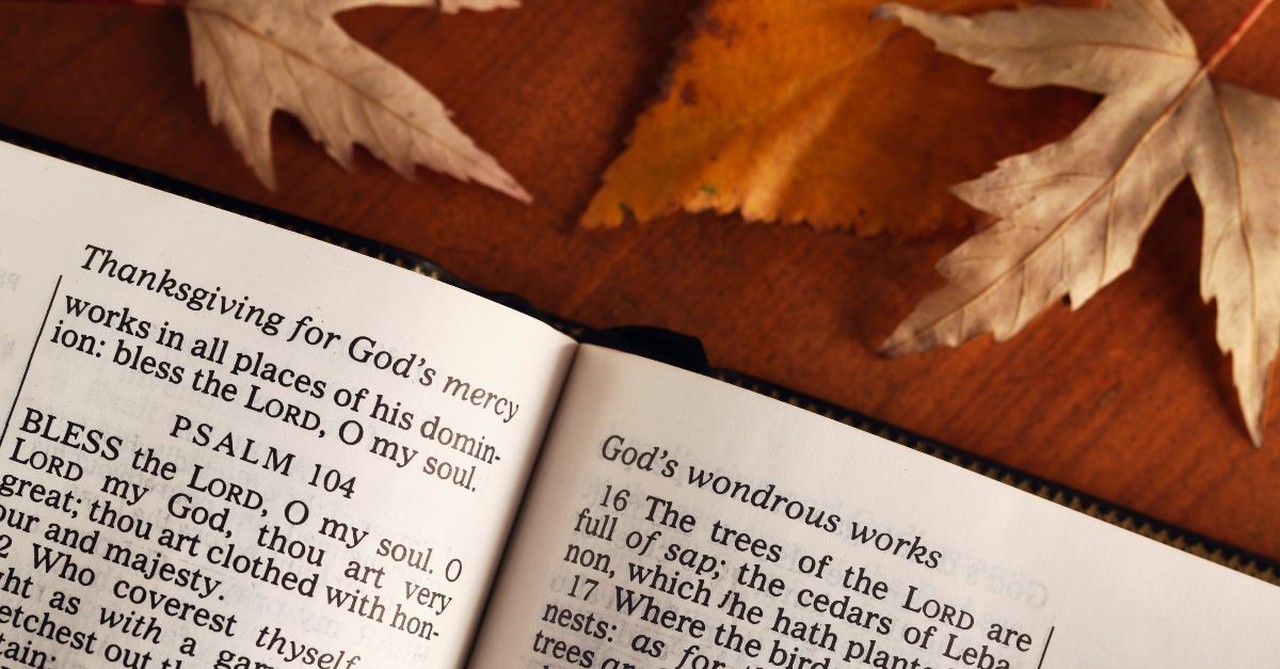King David’s Thanksgiving Playlist — 10 Psalms to Elevate Your Gratitude

The Scripture tells us to be thankful. Even when we come to God with our troubles and doubts, as valid as they are, we are told to approach the throne of the Father with thanksgiving and gratitude (Philippians 4:4-7). Since God is good and loving, his commandments are also for our good, as well.
We have so much to be thankful for, especially when we consider who God is and all he’s done, but we often have trouble getting into a thankful headspace. Here is where praise and worship can be a great help to focus on the Lord and his person in the midst of trying times.
There were people who sang before David (Moses, Miriam, others), but David set up a whole culture of signing to God, writing songs, and centered around the manifest presence of God.
From the Scripture, there’s no better person to look to than David for songs to bring us into a place of gratitude.
Here are 10 Psalms to elevate our gratitude.
Photo Credit: ©iStock/Getty Images Plus/CentralITAlliance
1. Psalm 9

1. Psalm 9
SLIDE 1 OF 10
In this psalm, the psalmist reflects on the Lord’s righteousness and justice, recounting the many ways God has come to the aid of His people.
The psalmist opens with a declaration of praise and thanks: “I will give thanks to you, Lord, with all my heart; I will tell of all your wonderful deeds” (Psalm 9:1).
Throughout the psalm, the writer celebrates God’s protection, deliverance from enemies, and the establishment of justice for the oppressed. The psalmist acknowledges that the Lord is a refuge for those in need, and His name is a strong tower for the righteous (v. 9).
Psalm 9 teaches us gratitude by emphasizing the importance of remembering God’s justice and deliverance from enemies. Even though hard times may happen, we can rest in the reality God is just and will make things right.
Just as God delivered David from his enemies, God will do the same for us. He is sovereign and faithful to his promise to be a refuge and a strong tower for his people during challenging times. His love transcends those difficulties.
Photo Credit: ©Getty/SARINYAPINNGAM
2. Psalm 23

2. Psalm 23
SLIDE 2 OF 10
Psalm 23 is a timeless and beloved passage that teaches us gratitude by portraying God as our caring and faithful shepherd. David’s vivid imagery of God’s provision, guidance, and protection evokes a deep sense of gratitude and trust.
The opening lines, “The Lord is my shepherd; I shall not want,” convey a profound sense of contentment and gratitude. With God as David’s shepherd, he lacks nothing. God is our provider in all things.
The psalm paints a picture of green pastures, still waters, and paths of righteousness, conveying a sense of peace and well-being.
Even in the presence of enemies and difficult circumstances, the psalmist expresses gratitude for God's protection and comfort. “You prepare a table before me in the presence of my enemies; you anoint my head with oil; my cup overflows” (Psalm 23:5).
This overflowing cup symbolizes God’s abundant blessings, inspiring gratitude for His goodness even in challenging times.
In the final verse, David declares, “Surely goodness and mercy shall follow me all the days of my life, and I shall dwell in the house of the Lord forever.”
Just as David could rest in the assurance of God’s eternal presence and promise, so can we. And with that sure promise, we praise and thank him.
Photo Credit: ©iStock/Getty Images Plus/kevron2001
3. Psalm 30

3. Psalm 30
SLIDE 3 OF 10
Psalm 30 reflects on a personal experience of deliverance and restoration, attributing it to the mercy and faithfulness of the Lord, teaching gratitude in several ways.
Firstly, the psalmist recalls a time of distress and suffering but testifies to God's intervention, turning mourning into dancing and sorrow into joy (Psalm 30:11).
Gratitude, in this context, arises from the recognition of how God transforms hard times into joyous ones through his amazing work.
Secondly, Psalm 30 encourages us to praise God even in difficult times. “I will extol you, O Lord, for you have drawn me up and have not let my foes rejoice over me” (Psalm 30:1), serves as a reminder that gratitude is not dependent on favorable circumstances. Gratitude in adversity is a powerful expression of trust and faith in God.
Lastly, the psalm emphasizes that God’s anger is temporary, while His favor and mercy endure for a lifetime. Our gratitude flows from the understanding that, despite life’s challenges and setbacks, God's enduring love and compassion are always available to sustain us.
Photo Credit: ©Unsplash/Kiy Turk
4. Psalm 32

4. Psalm 32
SLIDE 4 OF 10
Psalm 32 is a beautiful reflection on the relationship between confession, forgiveness, and gratitude.
The psalm begins by highlighting the blessedness of the one whose transgressions are forgiven and whose sins are covered (Psalm 32:1). This acknowledgment of God’s forgiveness sets the stage for gratitude. We all need forgiveness, and that recognition brings us to gratitude.
Next, David describes the heavy burden of unconfessed sin and the relief that comes from honest confession to God (Psalm 32:3-5).
Gratitude emerges as the psalmist experiences the freedom and joy that follow the confession of wrongdoing. There is a profound sense of gratitude in being able to lay our sins before God and receive His forgiveness and cleansing.
Additionally, Psalm 32 underscores the importance of trusting in the Lord (Psalm 32:10). Gratitude is closely tied to trust, as we recognize God’s faithfulness and goodness even in moments of vulnerability.
Lastly, David declares, “Many are the woes of the wicked, but the Lord's unfailing love surrounds the one who trusts in him” (Psalm 32:10), pointing to the enduring nature of God’s love. Gratitude flows from the realization that, despite our imperfections, the Father’s love surrounds us and sustains us.
Photo Credit: ©iStock/Getty Images Plus/MKucova
5. Psalm 34

5. Psalm 34
SLIDE 5 OF 10
God has told us not to worry. He will always care for us and our needs.
David begins Psalm 34 by declaring, “I will bless the Lord at all times; his praise shall continually be in my mouth” (Psalm 34:1). God is always worthy of praise, and we live this truth by continually praising him, regardless of the circumstances.
Next, David invites others to join in the celebration of God's goodness: “Oh, magnify the Lord with me, and let us exalt his name together!” (Psalm 34:3).
Gratitude is not meant to be a solitary endeavor but a communal expression. Sharing gratitude with others enhances its power and significance and invites them to praise.
Finally, David reflects on personal experiences of God’s deliverance and provision. These reflections serve as vivid illustrations of God’s faithfulness and inspire gratitude.
The psalmist acknowledges that those who seek the Lord lack no good thing (Psalm 34:10) and that God is near to the brokenhearted (Psalm 34:18).
When we are brokenhearted, he is near to us, closer than a brother or friend through the indwelling Spirit. That engenders great thankfulness and gratitude.
Photo Credit: ©iStock/Getty Images Plus/netrun78
6. Psalm 66

6. Psalm 66
SLIDE 6 OF 10
God is worthy of praise for all his mighty works. As we sing during Passover, if God does nothing else, what he’s already done is enough. Dayenu.
Psalm 66 opens with an invitation to “shout for joy to God, all the earth” and to “sing the glory of his name” (Psalm 66:1-2). This call to worship sets the stage for an attitude of gratitude, encouraging us to joyfully praise God.
Throughout the psalm, David recounts God’s mighty deeds, including parting the Red Sea and leading the Israelites through it (Psalm 66:5-6). Reflecting on God’s past acts of deliverance and provision reminds us of His faithfulness, fostering gratitude.
The writer encourages us to “come and see what God has done” (Psalm 66:5) and to “make known among the nations what he has done” (Psalm 66:16). We must choose to gather and focus on what God has done, and that recognition will lift our hearts in gratitude.
Psalm 66:15 highlights the concept of a “sacrifice of praise,” suggesting that offering praise and thanksgiving to God is a form of spiritual sacrifice. This reinforces the idea that gratitude is an intentional and sacrificial act. We take time and energy to focus on the Father.
As David emphasizes the importance of fearing God and acknowledging His sovereignty (Psalm 66:16), we learn gratitude is intertwined with reverence for God, recognizing His authority and majesty.
Photo Credit: ©iStock/Getty Images Plus/netrun78
7. Psalm 92

7. Psalm 92
SLIDE 7 OF 10
God doesn’t change. He is the same today, yesterday, and tomorrow. This truth gives us security in his love and faithfulness. He won’t decide he doesn’t love us tomorrow, no matter what we’ve done, and he will remain faithful to his promises.
Psalm 92 begins with the declaration, “It is good to give thanks to the Lord, to sing praises to your name, O Most High; to declare your steadfast love in the morning, and your faithfulness by night” (Psalm 92:1-2).
The mention of morning and night highlights the idea of continuous thanksgiving, both the expectation of the day and reflection upon it.
As a harpist, David encourages the use of music as a means of praising God. Psalm 92 speaks of playing musical instruments and singing to acknowledge God’s works (Psalm 92:3-4).
Here we see how musical instruments can help facilitate praise and worship and — as a result — gratitude.
The psalm contrasts the fate of the righteous with that of the wicked, emphasizing that the righteous will “flourish like the palm tree” and “grow like a cedar” (Psalm 92:12). Often, we feel as if we follow God for nothing; we don’t see any immediate impact.
However, we must rest in the promise that the righteous will bear fruit, both now and in the future. With this promise, we can have gratitude our actions have meaning, and God sees them and will reward them.
Photo Credit: ©iStock/Getty Images Plus/natalie_board
8. Psalm 95

8. Psalm 95
SLIDE 8 OF 10
Just as God calls us to worship him, we should take on his character and do the same, encouraging others to enter into praise and thanksgiving because He is worthy. At the same time, we will benefit in peace and power when we participate.
David begins with a stirring call to worship, urging us to “come, let us sing for joy to the Lord; let us shout aloud to the Rock of our salvation” (Psalm 95:1). This enthusiastic invitation is an amazing model for us to include others in our gratitude.
Throughout the psalm, David underscores God’s greatness as the Creator and sustainer of the earth and seas (Psalm 95:3-5). This praise centers around God’s character and person, and that alone is worthy of worship. He sustains the earth, and we can be thankful he sustains us, too.
His works come from his character, and David admonishes us not to harden our hearts as the Israelites did in the wilderness but to remember God's miraculous deeds (Psalm 95:7-8).
This brings us to kneel before the Lord, our Maker (Psalm 95:6). We often need to take physical positions of praise: kneeling, raising hands, and others. Including our body in praise leads us to joy and gratitude.
Photo Credit: ©iStock/Getty Images Plus/Marcela Ruth Romero
9. Psalm 100

9. Psalm 100
SLIDE 9 OF 10
Psalm 100 is often referred to as the “Psalm of Thanksgiving” and provides a beautiful and concise guide on how to cultivate gratitude in our worship and daily lives.
The psalm begins with an invitation to “make a joyful noise to the Lord, all the earth!” (Psalm 100:1). Praise means making noise.
Just as we shout in celebration when our favorite team scores, we should jump and cry out to God who is far more worthy. This stirs up gratitude in our hearts.
Psalm 100 encourages us to “serve the Lord with gladness” and to “come into his presence with singing” (Psalm 100:2). Furthermore, we are urged to “enter his gates with thanksgiving” and “his courts with praise” (Psalm 100:4).
For David, entering God’s presence would have been a physical place, the tent he set up outside of Jerusalem with the Ark of the Covenant.
For us, we have him with us in the Spirit at all times, but we still need to consciously turn to him and take the attitude of paying attention to his presence. It is still true we enter that wonderful presence with praise and thanksgiving.”
Gratitude is the gateway to enjoying more of his powerful and healing presence.
Photo Credit: ©GettyImages/ Drazen Zigic
10. Psalm 103

10. Psalm 103
SLIDE 10 OF 10
We aren’t a slave to our feelings or negative emotions that might seem to keep us from gratitude. Through Christ, we can speak to our own souls and make intentional choices, calling our own hearts to lift God up and experience the healing of gratitude.
Psalm 103 begins with David’s personal declaration to “bless the Lord, O my soul” and to “forget not all his benefits” (Psalm 103:2).
As humans, we can easily forget the greatness of God during hard times. But we have power through the Spirit to center our thoughts and attention on God and his immense blessings.
Therefore, the psalm continues with a listing of God’s attributes and actions, highlighting His forgiveness, healing, redemption, love, and compassion (Psalm 103:3-5).
We train our thinking, renewing our minds according to God’s ability, power, love, and truth through recounting his great attributes and deeds. This renewing of mind transforms us in every way, including making us more thankful.
David reflects on how God is slow to anger, abounds in steadfast love (Psalm 103:8), and forgets our sins (Psalms 103:12). For these alone, we are thankful and full of praise!
Psalm 103 concludes with a call to bless the Lord, all His works, and angels, acknowledging His supreme authority over all creation (Psalm 103:20-22).
Once we see our lives and circumstances in the big, eternal picture and under God’s supreme authority, we are full of gratitude for his love and provision.
Take time and read through these psalms and use them to enter God’s presence and call our soul to praise him. The gratitude we already possess will increase with more revelation in our relationship with God.
For further reading:
3 Examples of Ruth’s Heart of Gratitude to Remember This Thanksgiving
Listening to Music for the Lord
24 Beloved Thanksgiving Songs to Enjoy with Your Family
Photo Credit: ©iStock/Getty Images Plus/netrun78


Originally published October 31, 2023.









